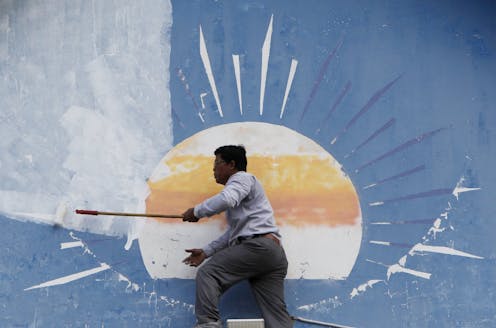One party to rule them all: Cambodia’s supreme court rules the dissolution of opposition party
- Written by Caroline Bennett, Lecturer in Cultural Anthropology, Victoria University of Wellington

Last week the domestic Supreme Court of Cambodia officially dissolved the main opposition party – the Cambodia National Rescue Party (CNRP). 118 of its officials were banned from politics for the next five years, and its 55 parliamentary seats will be redistributed across the house.
The move leaves the current ruling party, the Cambodian People’s Party (CPP), as the only real party in the run up to the 2018 general elections.
Dissolution no surprise
The dissolution was, sadly, expected. The lead judge was a senior CPP figure, and it is the result of political repression coursing through Cambodia for the last 18 months, including widespread suppression of the media.
Read more: Violent politics and the disintegration of democracy in Cambodia
The latest of this was the detention of political journalist Len Leng during the Supreme Court ruling, and the charging of espionage of two former free-Asia journalists on November 18. The period also included smear campaigns against opposition leaders and politicians, and the reported assassination of campaigner Kem Ley in 2016.
These increasingly repressive actions consolidate the rule of the CPP. The court ruling also potentially maintains this position for the 2023 elections. The five-year ban of large numbers of opposition politicians (with former leader Sam Rainsey still in exile, and current leader Kem Sokha under arrest for treason) means they will come back into play only months before the 2023 general elections, with no time to create a viable opposition.
The move to dismantle any opposition is further reinforced by an offer to opposition politicians to retain their seats by defecting to the ruling party. So far only 200 of the 6,000 party members have accepted.
The latest moves bring the autocracy into full view: not only is the ruling party not afraid of openly and violently suppressing the nation, but it now takes these actions in full disregard of the geopolitical repercussions. The US has stated that it will end its support for the 2018 elections. The EU stated that vital trade agreements may be threatened by the dismantling of human rights in the kingdom. China, Cambodia’s largest donor and biggest investor, however, has remained quiet.
Violent autocracy and global democracy
In a previous Conversation article, I linked the actions not only to the violent rule of the current leader, Hun Sen, but also to a rolling back of democracy around the globe, paralleled with a rise of autocracy.
Violence is an effective mechanism of authoritarian control. As my research shows, it works best in the wake of remembered conflict and violence, such as the decades of civil war Cambodia suffered throughout the 1960s and 70s, including the Khmer Rouge regime.
However, that control comes at a cost. The current ruling party narrative centres on the threat of revolution, accusing the opposition party, and media outlets deemed sympathetic to their cause, of colluding with international powers to plan its overthrow. No convincing evidence has yet come to light to discredit opposition voices and prove the ruling party’s position.
The Cambodian government is neither naïve nor ill-informed. CPP members are, in many ways, astute political players. Hun Sen knows well how to influence much of the population, and has in the past used all means necessary, from the violent coup of 1997 in which he first took full power, to aligning himself and his family with guardian spirits and the former king.
During my research, I found that for many people in the older generation, he remains, if not popular, at least a known protector and strong leader. He holds himself responsible for keeping peace in the kingdom for the last 38 years, and has used this narrative throughout his reign to keep power and promote himself as the patron of Cambodia.
Eroding power through violent means
As we move further and further from the Khmer Rouge, however, the persuasive rhetoric of saviour and protection becomes weaker and weaker. This was evident in the 2013 general election, when the opposition party made a substantial gain, and more recently in the 2017 local elections with similar gains. It is more evident now in the increasingly extreme measures the ruling party is willing to take to keep their hold on power.
As Hun Sen uses increasingly violent means to maintain control, he simultaneously erodes it in dramatic fashion. By eliminating the opposition party, the CPP guarantees success in the 2018 elections. But it also sets up the circumstances to dismantle its own power and government.
Hannah Arendt wrote that power and violence are antithetical – that power lies in persuasion, and it is only when power starts to wane that violence takes precedence. When violence reigns, it destroys power.
As Arendt argues, violence in politics is always instrumental. I suggest it serves to consolidate or increase strength, but this strength is precarious and highly volatile. The leaders around the world who resort to violence do so out of weakness and desperation – they know that without it they would have no power. Because of this, it has to grow, until the violence itself becomes an insurmountable issue to deal with.
I doubt Hun Sen’s rule will be toppled soon. When it is, it will likely be with violent resistance. But as we have seen around the world, though violence can be controlling, it is never persuasive, and eventually, it loses its grip. Mugabe is the latest example of the fall of the autocrat. When the CPP will fall is uncertain. But the increase in violence brings it all the much closer.
Authors: Caroline Bennett, Lecturer in Cultural Anthropology, Victoria University of Wellington




